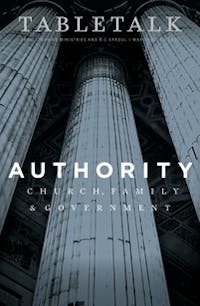
Request your free, three-month trial to Tabletalk magazine. You’ll receive the print issue monthly and gain immediate digital access to decades of archives. This trial is risk-free. No credit card required.
Try Tabletalk NowAlready receive Tabletalk magazine every month?
Verify your email address to gain unlimited access.
“You’re out!” “I’m safe!” “Out!” “Safe!” “Out!” “It’s my ball, and it’s my bat, and I say that I’m safe.” This is how we settled disputes over plays in our pickup baseball games played without the benefit of a referee or umpire. When a disputed play could not be resolved through reason or through yelling, the one who possessed the equipment usually determined the outcome. It was a child’s game in which might made right. It was the nascent expression of the cynical statement: “He who owns the gold, rules.”
These illustrations indicate that at some level ownership is involved in authority. The very word authority has within it the word author. An author is someone who creates and possesses a particular work. Insofar as God is the foundation of all authority, He exercises that foundation because He is the author and the owner of His creation. He is the foundation upon which all other authority stands or falls.
We use the term foundation with respect to the imagery of a building. Houses and commercial buildings are erected upon a foundation. As Jesus indicated in His parables, if the foundation is not solid, the structure will not stand. The house that is built upon the sand will crumble at the first sign of a windstorm. Instead, Jesus commended the building of the house upon a rock. The foundation has to be firm in order for the house to stand.
In the sixteenth century, the critical dispute that arose in the Protestant Reformation focused on two central issues. Historians speak of one as being the material cause, that is, the matter around which the dispute centered. That material cause was the doctrine of justification. The battle was fought over the issue of what is required for a person to be justified in the sight of God. The other issue, the formal one, lurked only slightly under the surface of the external debate about justification: the question of authority. When Luther defended his doctrine in his disputes with Cardinal Cajetan and with the theologian Johann Eck, the Roman Catholic experts called attention to the decrees of earlier church councils and of papal encyclicals to refute Luther’s arguments. Luther in response argued that the edicts of church councils and even the encyclicals of popes can err and often do err. The only final authority Luther would recognize, upon which the controversy could be resolved, was the authority of Scripture, because that authority carried the weight of God’s authority itself.
As a result, the Diet of Worms culminated with Luther’s expression: “Unless I am convinced by sacred Scripture or by evident reason, I cannot recant because my conscience is held captive by the Word of God, and to act against conscience is neither right nor safe. Here I stand. God help me. I can do no other.” In that statement, Luther was affirming publicly his commitment to the principle of sola Scriptura, that the Bible alone is the only authority that can bind the conscience of a person absolutely because it is the only authority that carries with it the intrinsic authority of God Himself.
In the Scriptures we see that God creates the universe and owns the universe. It is His possession, and He governs it by His own authority. The authority by which God governs all things is His autonomous authority. To say that God’s authority is autonomous is to say that God is a law unto Himself. He is not bound by some abstract system of law that exists outside of Himself or independent from Him (ex lex). Nor is God under some external law (sub lego); rather, He is a law unto Himself. This does not mean that He acts or behaves in an arbitrary manner. Rather, God’s activity is directed by God’s own character. And His character is completely righteous. All that He does flows out of His own internal righteousness. His external authority comes from His internal righteousness. In this sense God’s authority is intrinsic. It is found within Himself. It is not borrowed, delegated, or assigned from any other source.
In the same manner, all lesser authorities on heaven and on earth are only as valid as they are delegated by God’s authority. Whatever authority we possess is extrinsic rather than intrinsic. It exists only by delegation. This was the issue in the garden of Eden. The primal sin of Adam and Eve could be described as the grasping for autonomy. They sought to take for themselves the authority that belonged only to God. To act on one’s own authority against the authority of God is the essence of disobedience and of sin. When we grasp authority ourselves and do what is right in our own minds, we are attacking the very foundation of life and of the welfare of human beings.
“You’re out!” “I’m safe!” This question has to be determined by some foundation other than the possession of bats and balls. Justice must reign if we are to escape a life and a world without foundations. Any authority that rules without divine foundation is tyranny.
